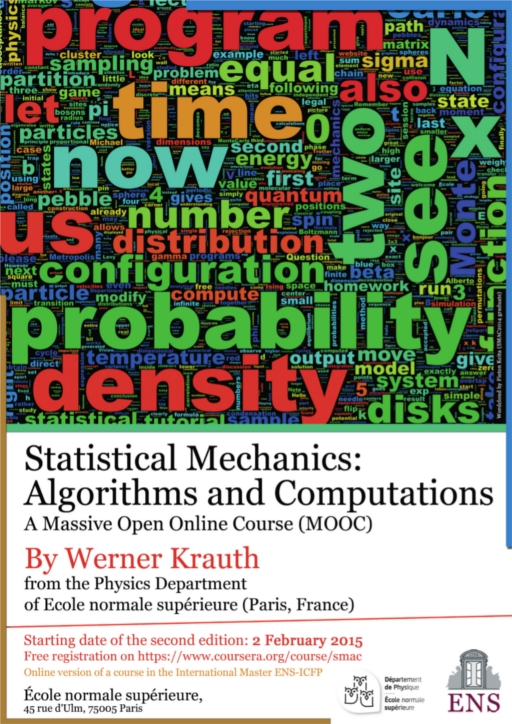Krauth 2014
From Werner KRAUTH
| Revision as of 21:34, 23 September 2015 Werner (Talk | contribs) ← Previous diff |
Revision as of 08:12, 6 October 2015 Werner (Talk | contribs) Next diff → |
||
| Line 9: | Line 9: | ||
| [http://arxiv.org/pdf/1410.0988 Electronic version (from arXiv, original version)] | [http://arxiv.org/pdf/1410.0988 Electronic version (from arXiv, original version)] | ||
| + | |||
| + | =Context, public presentations= | ||
| + | This article is based on a contributed talk I gave at [http://ccp2014.bu.edu/program/ the 2014 conference on Computational Physics] in Boston, Ma, USA. I will also give a talk on this subject at the Plenary Conference of the German Physics Departments in Berlin, Germany, on November 2, 2015. | ||
| =Poster (Announcement of the 2015 MOOC)= | =Poster (Announcement of the 2015 MOOC)= | ||
Revision as of 08:12, 6 October 2015
W. Krauth Coming home from a MOOC Computing in Science and Engineering 17(2) 91-95 (2015)
Paper (Preprint)
Abstract My ten-week Massive Open Online Course "Statistical Mechanics: Algorithms and Computations", in early 2014, focused on subjects such as Monte Carlo sampling, molecular dynamics, transition phases in hard-sphere liquids, simulated annealing, classical spin models, quantum Monte Carlo algorithms, and Bose-Einstein condensation, etc. It familiarized a huge international crowd of students with cutting-edge subjects in computational physics. Here, I present the topics of the course, its basic design ideas, its scope and challenges, and compare it with earlier attempts in online teaching.
Electronic version (from arXiv, original version)
Context, public presentations
This article is based on a contributed talk I gave at the 2014 conference on Computational Physics in Boston, Ma, USA. I will also give a talk on this subject at the Plenary Conference of the German Physics Departments in Berlin, Germany, on November 2, 2015.
Poster (Announcement of the 2015 MOOC)

